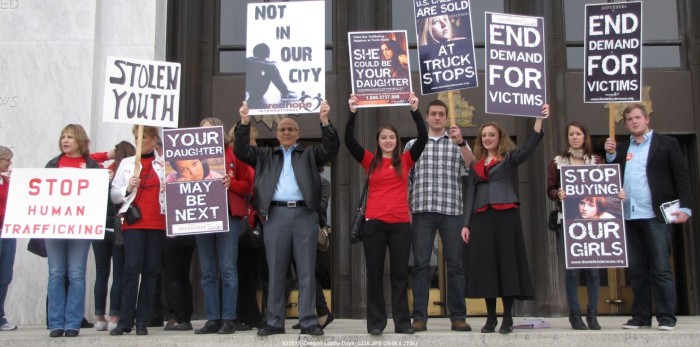Guest Blog Post by Ethan Morrow

A few weeks ago I had the privilege of attending a lobbying event at the Oregon capitol building, in Salem, OR. At the event, hundreds of people advocated for two bills that would help crack down on buyers, and offer better protection for victims of human trafficking. It was very encouraging to see the variety of people that showed up. From pastors and ministers, to college students and children — who took a day off of school to make a difference, a very diverse crowd of people showed up.
It was very encouraging for me to see so many people show up and engage in the process of politics in order to make a difference and protect women and children. In addition to this encouragement, the process of this event was also fascinating. I say this because I got an inside look into the political system. Everyone who lobbied, including myself, got the opportunity to enter into the offices of individual politicians. We got to speak with senators and representatives personally. We got to have a regular conversations, and we got to share our own personal experiences with human trafficking, and why it is important we end it.
I realized that politicians are people too, and they are highly influenced by the power of personal, individual story. A group of students from a Warner Pacific College student club delivered a large stack of hand-written, individually addressed letters that encouraged the politicians to support the bills. People showed up, conversations were had, and we made a huge influence!
That is a testament to the power of taking action. It truly shows that together, we can end demand. Together, we can change society and make a difference. At this lobbying event, the idea of changing the world wasn’t just an idea—it was becoming a reality.
Defenders, we can make a difference. Our stories have impact. We just need to share them. I want to issue a challenge to all Defenders: show up and share your story. At this lobbying event, it was probably 90% women—maybe even more. What if we had a lobbying event that was 50/50, or even 90% or 100% men? Imagine the impact we could make in supporting bills that target the johns and buyers. My fellow Defenders, together, we can end demand. Will you join the cause?
 Johns reported that they purchased sex because they were guaranteed submissiveness on the part of the prostituted woman or child. The distinct power imbalance and lack of relationship obligation was noted as a driving factor for those who purchase sex. Many of the johns reported having girlfriends or wives, and say they purchase sex to do the “dirty” sex acts that they would not do with their significant others because these acts could cause her to lose her self esteem. Though sex buyers recognize these distinctions, many commented that the sense of entitlement and degradation towards woman that develops from purchasing sex taints other relationships and their general attitude towards women.
Johns reported that they purchased sex because they were guaranteed submissiveness on the part of the prostituted woman or child. The distinct power imbalance and lack of relationship obligation was noted as a driving factor for those who purchase sex. Many of the johns reported having girlfriends or wives, and say they purchase sex to do the “dirty” sex acts that they would not do with their significant others because these acts could cause her to lose her self esteem. Though sex buyers recognize these distinctions, many commented that the sense of entitlement and degradation towards woman that develops from purchasing sex taints other relationships and their general attitude towards women. In 2008,
In 2008, 





